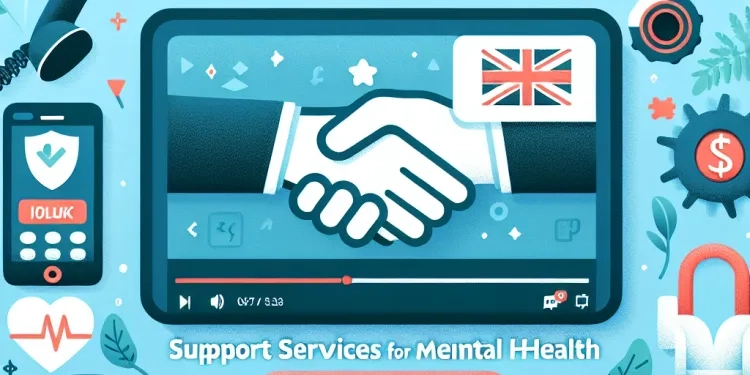
Find Help
More Items From Ergsy search
-
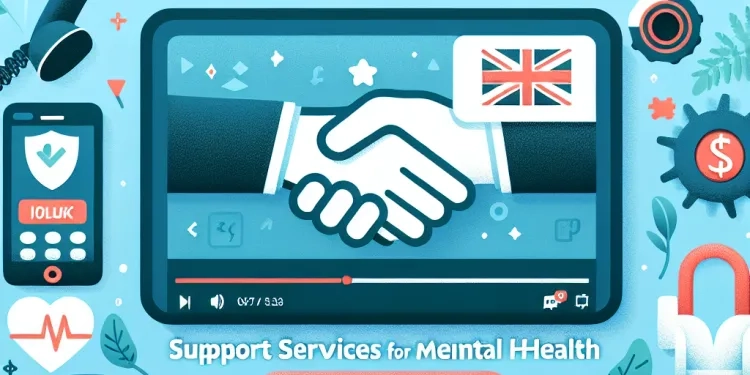
Support Services for Mental Health Amid Economic Uncertainty
Relevance: 100%
-

Mental Health Support Services in the UK
Relevance: 59%
-

Mental Health Support Resources in the UK
Relevance: 48%
-
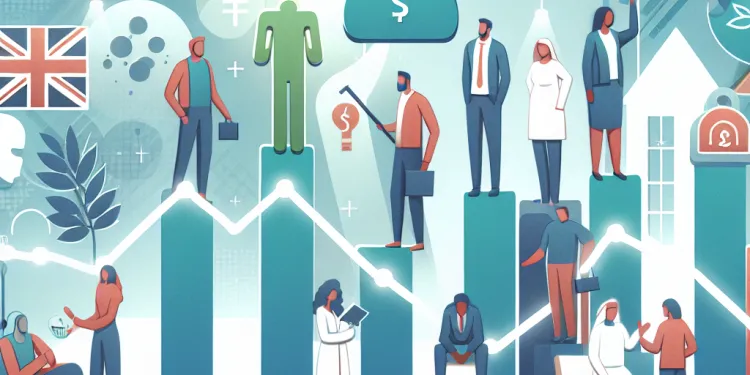
Mental Health Services Struggle to Cope Amid Record Demand
Relevance: 47%
-

Accessing Mental Health Support Resources in the UK
Relevance: 46%
-

Mental Health Impact of Cost of Living Crisis and Support Resources
Relevance: 46%
-

Navigating Mental Health Services for Children and Adolescents
Relevance: 45%
-

Current Challenges in Youth Mental Health Services
Relevance: 45%
-

Mental Health Support Resources for Families
Relevance: 44%
-

Mental Health Support for Families: Resources and Helplines
Relevance: 44%
-

Mental Health Support for Families: Resources and Strategies
Relevance: 44%
-

Can primary care support workers access mental health support?
Relevance: 42%
-

Mental Health Support for Families: Resources and Guidance
Relevance: 42%
-

NHS Unveils Revolutionary Mental Health Support Initiative
Relevance: 42%
-

Mental Health Support for Families - Latest Resources and Guidance
Relevance: 40%
-

New Report Highlights Gaps in Mental Health Services for Welfare Recipients
Relevance: 40%
-

Mental Health Resources for Families
Relevance: 39%
-
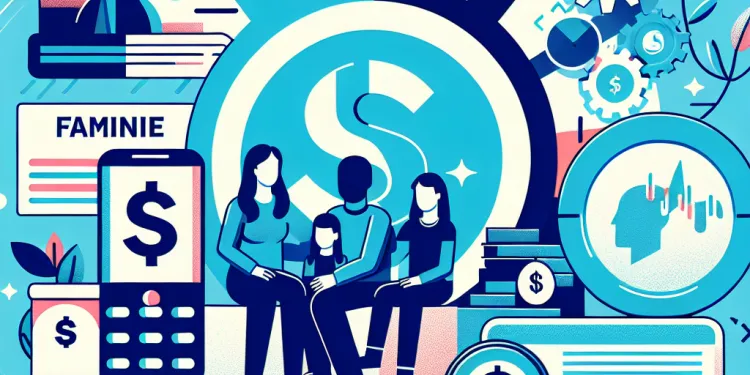
Advancements in Mental Health Resources for Families
Relevance: 37%
-

Essential Tips for Mental Health and Well-Being Amidst Rising Living Costs
Relevance: 36%
-

Understanding Mental Health in Children
Relevance: 36%
-

NHS-led Provider Collaboratives: improving mental health, learning disability and autism services
Relevance: 35%
-

Mental Health: Laura's Story | NHS
Relevance: 35%
-

Understanding Your Rights: Legal Support for Families During Economic Turbulence
Relevance: 34%
-
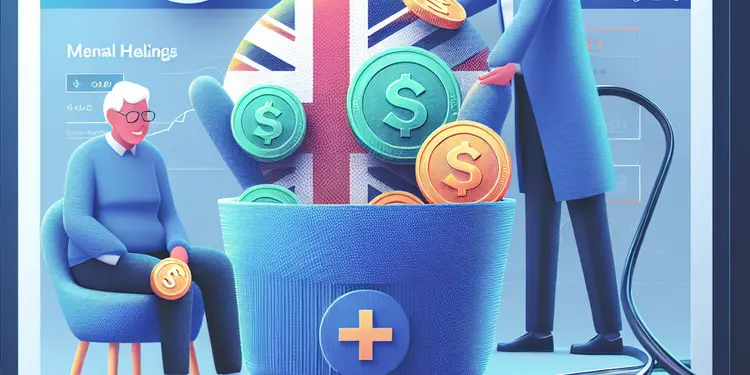
What mental health resources are available for seniors?
Relevance: 33%
-

How are health services provided in prison?
Relevance: 33%
-

Tackling Youth Mental Health: Community Initiatives and Solutions
Relevance: 33%
-

What is the impact of obesity on mental health?
Relevance: 33%
-
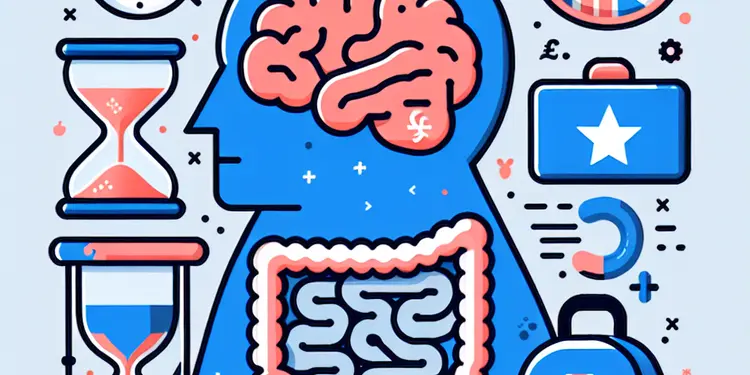
Can gut health affect mental health as one ages?
Relevance: 31%
-

How does the loneliness epidemic impact mental health?
Relevance: 31%
-

Short Films About Mental Health - Trauma PTSD
Relevance: 31%
-

Are there online support services for prostate cancer patients on the NHS?
Relevance: 30%
-

How can community helpers get mental health support?
Relevance: 30%
-

Can relationship problems be resolved to improve mental health?
Relevance: 30%
-

New Mental Health Strategy Launched to Address Youth Anxiety Epidemic
Relevance: 30%
-

Can concussions lead to mental health issues?
Relevance: 30%
-

How do eating disorders affect mental health?
Relevance: 29%
-

What is the role of mental health assessments in indefinite sentences?
Relevance: 29%
-

What constitutes economic abuse under the Domestic Abuse Act 2021?
Relevance: 29%
-

New Report Highlights Gaps in Mental Health Support for Benefit Recipients
Relevance: 29%
-

Can mixed exercises improve mental health?
Relevance: 29%
Support Services for Mental Health Amid Economic Uncertainty
The Importance of Mental Health Support
Mental health is a critical aspect of overall wellbeing, and during times of economic uncertainty, it becomes even more vital. The stress of job insecurity, financial strain, and the ever-changing economic landscape can lead to a rise in anxiety, depression, and other mental health issues. Recognising the importance of mental health, the United Kingdom has numerous support services in place to help individuals navigate these challenging times.
Government-Funded Mental Health Services
The National Health Service (NHS) offers a range of mental health services that are free at the point of use. Services include counseling, therapy, and psychiatric treatment, which are accessible through GP referrals or by self-referral to certain services. During times of economic difficulty, the demand for these services often increases, prompting the NHS to continuously adapt and expand its mental health support capabilities. Initiatives such as the Improving Access to Psychological Therapies (IAPT) program have been instrumental in providing timely mental health care.
Charitable Organisations and Non-Profits
Beyond the NHS, there are numerous charitable organisations and non-profits dedicated to providing mental health support. Organisations such as Mind, Rethink Mental Illness, and Samaritans offer helplines, counseling, and community-based support groups. These charities often provide specialized services for different demographics, including children, young adults, and veterans, ensuring that help is tailored to the specific needs of diverse groups within the population.
Online and Digital Mental Health Resources
In response to economic challenges, there has been significant growth in online and digital mental health resources. Websites, mobile apps, and online counseling services provide accessible and flexible options for those seeking support. Platforms such as Kooth and Headspace offer mental health tools, guided meditations, and online consultations, giving individuals the ability to access help from the comfort of their own homes, which can be particularly beneficial during financially tough times.
Community and Peer Support
Local communities and peer support networks play a crucial role in mental health support. Many communities have local groups and initiatives run by volunteers that provide social support, share resources, and promote mental wellbeing. Peer support can be incredibly powerful, as it allows individuals to connect with others who have experienced similar struggles. During economic uncertainty, these community bonds can provide much-needed emotional and practical support.
Conclusion
Economic uncertainty can take a significant toll on mental health, but various support services are available across the United Kingdom to help individuals manage their mental wellbeing. From government-funded services and charitable organisations to digital resources and community support, there are numerous options for those seeking help. Ensuring awareness and accessibility of these services is essential in promoting mental health during challenging economic times.
Help for Mental Health When Money is Tight
Why Mental Health Help is Important
Looking after your mental health is very important. When money is tight, it becomes even more important. Worrying about jobs and money can make people feel anxious or sad. In the UK, there is help available for those who feel this way.
Government Mental Health Programs
The National Health Service (NHS) provides free help for mental health. This help includes talking therapy and other treatments. You can get this help by visiting your doctor or sometimes by asking directly. When money is tight, more people need this help, so the NHS tries to provide more support. Programs like Improving Access to Psychological Therapies (IAPT) help provide quick support.
Charities and Non-Profit Groups
Besides the NHS, there are charities that help too. Groups like Mind, Rethink Mental Illness, and Samaritans have helplines and support groups. They offer help especially for children, young adults, and veterans. This means help is given in ways that suit different people.
Online Help for Mental Health
There is a lot of help online now. Websites and apps like Kooth and Headspace offer support and guided meditations. You can use these from home, which is good when money is tight and you need easy access to help.
Help from the Community
Local communities and people helping each other are important for mental health too. Some groups are run by volunteers who understand what you are going through. They provide emotional and practical support, which is very helpful when money is tight.
Conclusion
When money is tight, it can be hard on mental health. In the UK, there are many ways to get help. From government and charities to online resources and community support, there is always someone who can help you feel better. Knowing about these options is key to staying well during tough times.
Frequently Asked Questions
What types of mental health support are available during economic uncertainty in the UK?
Types of mental health support available include counseling, therapy, support groups, helplines, and online resources. NHS services, charitable organizations, and private sector options are also available.
How can I access NHS mental health services?
You can access NHS mental health services by seeing your GP for a referral, using the NHS 111 service, or directly contacting local mental health services.
Are there free mental health services available?
Yes, the NHS provides free mental health services. Many charities and support groups also offer free or low-cost mental health support.
What should I do if I am in a mental health crisis?
If you're in a mental health crisis, contact emergency services by dialing 999, go to A&E, or call the Samaritans at 116 123. You can also contact your GP for urgent support.
How can I find a qualified therapist or counselor in my area?
You can find a qualified therapist or counselor through the NHS, by getting a referral from your GP, or by using directories such as the British Association for Counselling and Psychotherapy (BACP) or the UK Council for Psychotherapy (UKCP).
What mental health support is available specifically for young people?
Support for young people includes Child and Adolescent Mental Health Services (CAMHS), helplines like Childline, and organizations such as YoungMinds and Kooth offering online support.
Can economic uncertainty affect my mental health?
Yes, economic uncertainty can lead to increased stress, anxiety, and depression. It's essential to seek support if you feel your mental health is being affected.
How can I manage my stress and anxiety during economic hardships?
Managing stress and anxiety can be achieved through regular exercise, maintaining a routine, seeking social support, practicing mindfulness, and accessing professional help if needed.
Are there online mental health resources I can use?
Yes, there are many online resources such as NHS apps, Mind, and the Mental Health Foundation offering information, self-help tools, and virtual therapy sessions.
What should I do if I can't afford private mental health treatment?
If you can't afford private treatment, seek NHS services or contact charities like Mind, Samaritans, and Anxiety UK, which offer free or low-cost support options.
How can I support a friend or family member struggling with mental health issues during economic uncertainty?
Listen empathetically, encourage them to seek professional help, offer practical support, and educate yourself about mental health issues to provide better assistance.
What are some signs that I might need professional mental health support?
Signs include persistent feelings of sadness, anxiety, or hopelessness, changes in sleep or appetite, withdrawing from social activities, and difficulty coping with daily life.
Are there specific mental health services for vulnerable populations like the homeless or unemployed?
Yes, there are targeted services available. Organizations such as Shelter and Crisis provide mental health support for the homeless, and Jobcentre Plus offers resources for the unemployed.
Can my employer provide any mental health support?
Employers may offer support through Employee Assistance Programs (EAPs), mental health days, workplace counseling, and promoting a healthy work-life balance.
What is the role of charities in providing mental health support?
Charities like Mind, Rethink Mental Illness, and the Samaritans play a significant role by offering helplines, counseling, peer support, advocacy, and resources to those in need.
What help is there for mental health when money is tight in the UK?
When money is tight, people can feel stressed or worried. There are different places you can get help for your mental health:
- Talk to a doctor: They can help you find someone to talk to.
- Call a helpline: You can talk to a kind person at any time.
- Online support: There are websites where you can chat or read helpful tips.
- Friends and family: Talking to someone you trust can make you feel better.
These are some ways to get help and feel better when times are tough.
There are many ways to get help for your feelings and mental health. You can talk to someone in counseling or therapy. You can join a group where people support each other. You can call a helpline to talk to someone who cares. You can also find help on websites and online. You can get help from NHS, charities, or private companies.
How can I get NHS mental health help?
Do you need help with your thoughts and feelings? The NHS can help you.
Here is how you can get help:
- Talk to your family doctor (GP).
- Your GP can give you advice and help.
- You can also search for help online.
- Go to the NHS website to find more information.
You can use these tools to help you:
- Ask someone you trust to help you talk to your GP.
- Use pictures or videos to understand better.
- Write down your feelings to show your doctor.
Remember, it’s okay to ask for help.
You can get help for your mental health from the NHS in these ways:
- Talk to your doctor. They can send you to the right service.
- Call 111. They can help you find mental health support.
- Contact your local mental health services yourself.
If it's hard to make these contacts, ask a friend, family member, or support worker to help you.
Can I get free help for my feelings?
Sometimes we feel sad or worried. It is important to get help. You can find places that help you feel better without paying money. Here are some ideas:
- Talk to a doctor or nurse.
- Look online for free phone numbers to call for help.
- Ask at your local community center for free support groups.
It is okay to ask for help. You are not alone!
Yes, the NHS gives free help for mental health. Many charities and support groups also offer free or cheap mental health support.
What can I do if I feel very upset or worried?
If you feel very upset or worried, you are in a mental health crisis. Here are some steps that can help:
- Tell someone: Talk to a family member or a friend you trust. They can listen and help you.
- Call for help: Use the phone to call a doctor or a helpline. They know how to help you feel better.
- Breathe slowly: Take deep breaths in and out. This can help you feel calm.
- Write it down: Use paper to write how you feel. This can make things clearer for you.
Remember, you are not alone. People care about you and want to help.
If you feel very upset or scared, you can get help. Call 999, go to the hospital's A&E, or talk to Samaritans by calling 116 123. You can also talk to your doctor for help.
How can I find a good therapist or counselor nearby?
Finding the right therapist or counselor can help you. Here are some simple steps to do it:
- Ask someone you trust: You can talk to a family member, teacher, or friend.
- Look online: Use a computer or phone to search for therapists near you.
- Use special websites: Some websites can help you find therapists. They show who is close to you and what they can help with.
- Visit your doctor: Doctors can help you find a therapist.
Remember, it is okay to ask for support. Therapists are there to help you feel better.
You can find a good therapist or counselor by:
- Asking your doctor for help.
- Looking on the NHS website.
- Checking online lists like the British Association for Counselling and Psychotherapy (BACP).
- Searching the UK Council for Psychotherapy (UKCP) website.
If you need help reading, try asking someone you trust to read with you or use apps that can read text out loud.
What help is there for young people with mental health problems?
Young people can get help for their feelings and thoughts. Some places and people can support you:
- Talk to an adult: Speak with a parent, teacher, or someone you trust.
- School counselor: Schools often have counselors you can talk to.
- Helplines: You can call or text a helpline for free. They listen and give advice.
- Online chats: Some websites have chats where you can talk about how you feel.
- Doctor: A doctor can help you and tell you where to get more help.
It's okay to ask for help. You are not alone.
Help for young people includes services like CAMHS, where they talk about feelings. You can call Childline if you need help. There are groups like YoungMinds and Kooth that help online too.
Can money worries make me feel upset or worried?
Yes, money worries can make people feel stressed, worried, and sad. It's important to get help if you are feeling this way.
How can I feel better when money is tight?
Here are some ways to help:
- Take deep breaths: When you feel worried, try breathing slowly to calm down.
- Talk to someone: Share how you feel with a friend or family member.
- Make a plan: Write down what you need to do and take small steps to solve problems.
- Exercise: Moving your body, like walking or dancing, can make you feel better.
- Use apps or tools: Try using apps that help with relaxing, like Calm or Headspace.
Remember, it’s okay to ask for help if you need it!
You can feel less stress and worry by doing a few things. Try to exercise often, keep a daily routine, talk to friends or family, do some relaxing activities like deep breathing or meditation, and if you still need help, talk to a doctor or counselor.
Can I find help for my feelings on the internet?
You can find websites to help with your feelings. These can give advice to feel better.
Here are some things you can try:
- Watch videos that talk about feelings.
- Listen to calming music or sounds.
- Use apps that help you feel relaxed.
Remember, talking to a trusted adult can help. They can find more ways to support you.
Yes, there are lots of online help. You can use NHS apps, Mind, and the Mental Health Foundation. They give you information, self-help tools, and online talking sessions.
What can I do if I can't pay for private mental health help?
If you can't pay for private mental health help, here are some things you can do:
- Talk to your doctor. Your doctor can help you find other ways to get help.
- Look for community health centers. They often have free or low-cost services.
- Check if there are charities that offer support. Some charities have free counseling.
- Use online support. There are websites and apps that can help you feel better.
- Talk to family or friends. They can be a good support and help you find more help.
Remember, you are not alone. It's okay to ask for help.
If you can't pay for private care, try NHS services. You can also reach out to charities like Mind, Samaritans, and Anxiety UK. They can give free or cheap help.
How can I help a friend or family member having a hard time with their feelings when money is tight?
When money is tight, some people feel worried or sad. Here’s how you can help:
- Listen to them: Let them talk about how they feel.
- Be there: Spend time with them and show you care.
- Encourage them: Tell them it’s good to talk to a doctor or therapist.
- Do fun things: Suggest doing something fun together.
- Learn together: Read books or watch videos about feelings.
You can also find helpful apps or use calm music to relax together.
Listen with kindness, tell them to talk to a doctor or therapist, help them with things they need, and learn more about mental health to help them better.
How do I know if I need help for my feelings?
Here are some signs that you might need to talk to someone like a doctor or counselor:
- You feel sad or upset a lot.
- You worry too much or feel scared for no reason.
- You get angry easily or have big mood swings.
- You have trouble sleeping or eating.
- You find it hard to do things you used to enjoy.
- You feel alone even when you're with others.
Some things that can help:
- Talk to a trusted adult, like a parent or teacher.
- Write about your feelings in a diary.
- Draw or play to express your feelings.
- Breathe deeply and try to relax.
If you still feel bad, it's okay to ask for help from a doctor or counselor.
Look out for signs like always feeling sad, worried, or like nothing will get better. Other signs are sleeping too much or too little, eating more or less, not wanting to be with friends, and finding everyday things really hard.
Try using calming tools like deep breathing, talking to someone you trust, or writing down your feelings.
Are there special health services for people who need extra help, like those without a home or a job?
Yes, there are special services that can help. Shelter and Crisis help homeless people with their feelings. Jobcentre Plus helps people who don't have jobs.
Can my boss help me if I feel upset or worried?
Bosses can help workers by doing these things:
- They might have programs to assist workers when they need help.
- They can let workers take days off when they are feeling sad or stressed.
- They might have someone to talk to at work if workers have problems.
- They can make sure workers have time for both work and fun.
How do charities help with mental health?
Charities are groups that help people.
They give support to people who feel sad or worried.
If you need help, you can talk to someone at a charity.
They can listen to you and give advice.
Charities can also teach you ways to feel better.
They might have classes or fun activities to help you.
Talking to someone or doing activities can help keep your mind healthy.
Charities like Mind, Rethink Mental Illness, and the Samaritans help a lot. They have phone lines where you can talk to someone, people who can listen and give advice, and ways to find friends who understand. They also speak up for people and have useful information. These are some ways they support people who need help.
Useful Links
Have you found an error, or do you have a link or some information you would like to share? Please let us know using the form below.
-->
This website offers general information and is not a substitute for professional advice.
Always seek guidance from qualified professionals.
If you have any medical concerns or need urgent help, contact a healthcare professional or emergency services immediately.
Some of this content was generated with AI assistance. We’ve done our best to keep it accurate, helpful, and human-friendly.
- Ergsy carfully checks the information in the videos we provide here.
- Videos shown by Youtube after a video has completed, have NOT been reviewed by ERGSY.
- To view, click the arrow in centre of video.
- Most of the videos you find here will have subtitles and/or closed captions available.
- You may need to turn these on, and choose your preferred language.
- Go to the video you'd like to watch.
- If closed captions (CC) are available, settings will be visible on the bottom right of the video player.
- To turn on Captions, click settings .
- To turn off Captions, click settings again.
More Items From Ergsy search
-

Support Services for Mental Health Amid Economic Uncertainty
Relevance: 100%
-

Mental Health Support Services in the UK
Relevance: 59%
-

Mental Health Support Resources in the UK
Relevance: 48%
-

Mental Health Services Struggle to Cope Amid Record Demand
Relevance: 47%
-

Accessing Mental Health Support Resources in the UK
Relevance: 46%
-

Mental Health Impact of Cost of Living Crisis and Support Resources
Relevance: 46%
-

Navigating Mental Health Services for Children and Adolescents
Relevance: 45%
-

Current Challenges in Youth Mental Health Services
Relevance: 45%
-

Mental Health Support Resources for Families
Relevance: 44%
-

Mental Health Support for Families: Resources and Helplines
Relevance: 44%
-

Mental Health Support for Families: Resources and Strategies
Relevance: 44%
-

Can primary care support workers access mental health support?
Relevance: 42%
-

Mental Health Support for Families: Resources and Guidance
Relevance: 42%
-

NHS Unveils Revolutionary Mental Health Support Initiative
Relevance: 42%
-

Mental Health Support for Families - Latest Resources and Guidance
Relevance: 40%
-

New Report Highlights Gaps in Mental Health Services for Welfare Recipients
Relevance: 40%
-

Mental Health Resources for Families
Relevance: 39%
-

Advancements in Mental Health Resources for Families
Relevance: 37%
-

Essential Tips for Mental Health and Well-Being Amidst Rising Living Costs
Relevance: 36%
-

Understanding Mental Health in Children
Relevance: 36%
-

NHS-led Provider Collaboratives: improving mental health, learning disability and autism services
Relevance: 35%
-

Mental Health: Laura's Story | NHS
Relevance: 35%
-

Understanding Your Rights: Legal Support for Families During Economic Turbulence
Relevance: 34%
-

What mental health resources are available for seniors?
Relevance: 33%
-

How are health services provided in prison?
Relevance: 33%
-

Tackling Youth Mental Health: Community Initiatives and Solutions
Relevance: 33%
-

What is the impact of obesity on mental health?
Relevance: 33%
-

Can gut health affect mental health as one ages?
Relevance: 31%
-

How does the loneliness epidemic impact mental health?
Relevance: 31%
-

Short Films About Mental Health - Trauma PTSD
Relevance: 31%
-

Are there online support services for prostate cancer patients on the NHS?
Relevance: 30%
-

How can community helpers get mental health support?
Relevance: 30%
-

Can relationship problems be resolved to improve mental health?
Relevance: 30%
-

New Mental Health Strategy Launched to Address Youth Anxiety Epidemic
Relevance: 30%
-

Can concussions lead to mental health issues?
Relevance: 30%
-

How do eating disorders affect mental health?
Relevance: 29%
-

What is the role of mental health assessments in indefinite sentences?
Relevance: 29%
-

What constitutes economic abuse under the Domestic Abuse Act 2021?
Relevance: 29%
-

New Report Highlights Gaps in Mental Health Support for Benefit Recipients
Relevance: 29%
-

Can mixed exercises improve mental health?
Relevance: 29%


